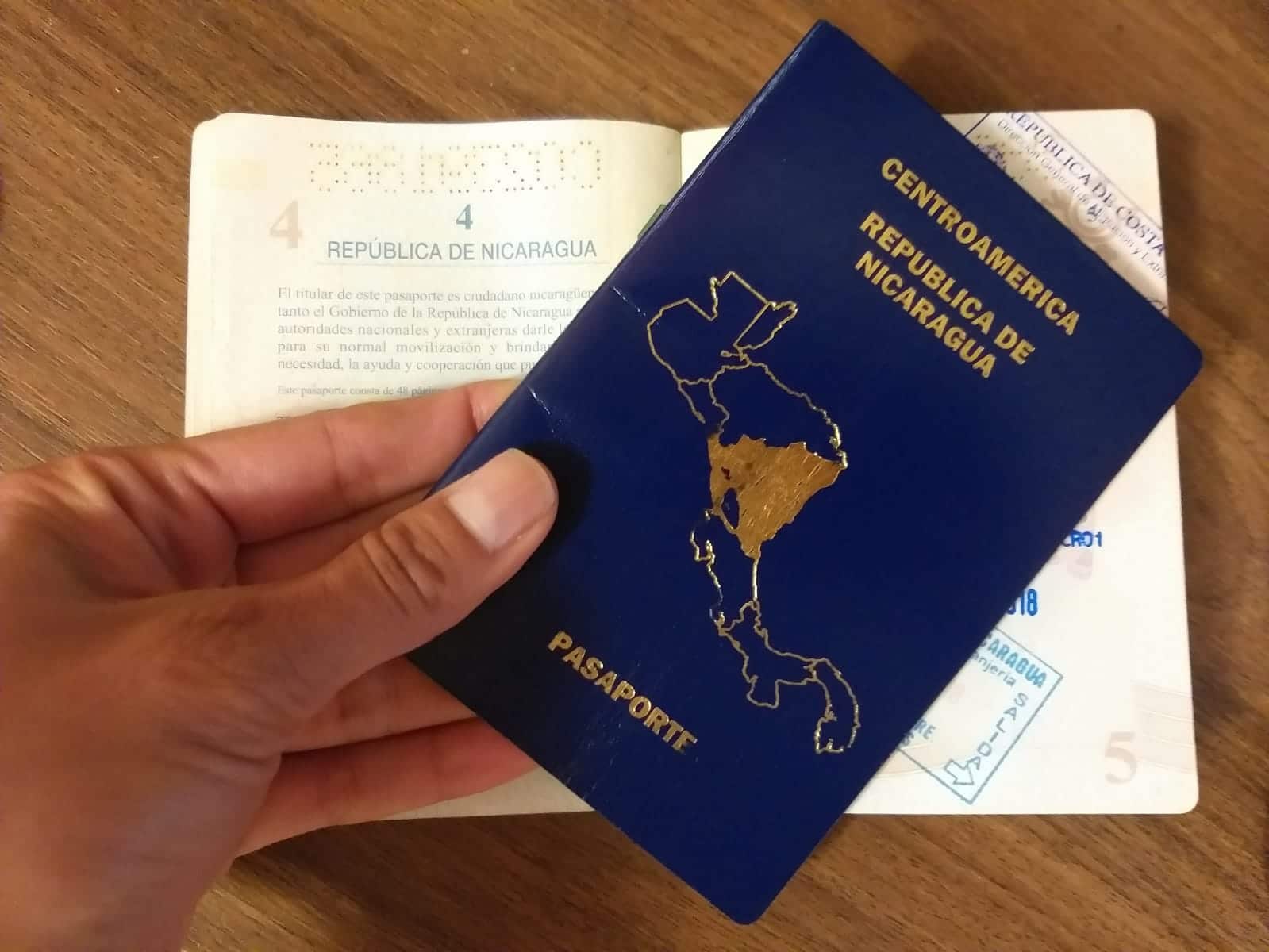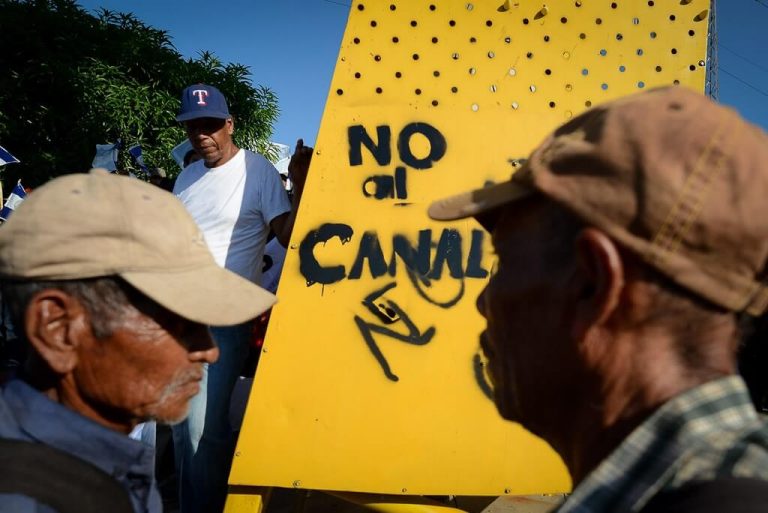
Nicaragua: Public Employees Hindered from Traveling to USA

PUBLICIDAD 1M
PUBLICIDAD 4D
PUBLICIDAD 5D
Its refusal to do so raises reasonable doubts as to whether the study finds the Nicaraguan canal project to be economically feasible.

The Panama Canal’s expanded “third set of locks” officially opened June 26. It will take some time to fully assess its effects on international commerce. But one thing is clear: any serious study of the economic viability of a Nicaraguan interoceanic canal to compete with Panama cannot be completed until the effects on global shipping of the Panama expansion can be evaluated.
Hong Kong Nicaragua Canal Development Group (HKND) and the Nicaraguan government of President Daniel Ortega claimed to have broken ground on the Nicaraguan canal a year and a half ago. But no significant work appears to have been completed.
The total cost of the Great Interoceanic Canal of Nicaragua is estimated by HKND at $50 billion, and by international observers at $70 billion to $100 billion. Before contracting out the construction of an infrastructure giga-project of this magnitude, one could reasonably expect that a rigorous study of economic viability and feasibility, among other types of studies, would be completed, made public, and discussed in Nicaragua and abroad.
But that has not happened. In 2013, HKND hired McKinsey & Company, a major U.S. consulting firm, to do an economic viability study. HKND claimed in 2015 that the study was ongoing, but now says that it was completed in 2014, and that the relationship with McKinsey was terminated in 2015. The study is reportedly being used to raise capital, but neither HKND nor the Nicaraguan government has divulged any of the content or conclusions to the public.
Given that Wang Jing, the chairman of HKND, reportedly lost over 80 percent of his $10 billion fortune in the Chinese stock market crash of 2015, he would ostensibly have to attract even more investment to fund such an enormous project. And his risk-management capabilities might be called into question by the magnitude of his losses in that debacle.
Prima facie, the choice of HKND for the project without competitive bidding and the passage of much-criticized enabling laws at breakneck speed should have raised alarms. The commissioning of the study by HKND rather than the Nicaraguan government should have raised questions about the incentives and pressures such an arrangement may have exerted on McKinsey. And any study completed two years ago would need to be updated substantially to take account of the completion of the Panama expansion and other major changes in the global economy and shipping industry.
In my article on the canal in Confidencial (English) and Envío (Spanish), I cited a piece by Greg Miller, of the U.S. business web site JOC.com, on the outcome of the study. A summary of my story by Cinthia Membreño of Confidencial elaborated on Miller’s reporting.
The response by Bill Wild of HKND, as reported by Informe Pastrán, was entitled “McKinsey no tiene problemas con HKND” (“McKinsey does not have problems with HKND”). But Wild did not present evidence for this assertion. Rather, his comments were devoted mainly to establishing that HKND had no problems with McKinsey.
Wild distorts Miller’s words, incorrectly asserting that the journalist accused HKND of not paying McKinsey. “Terceras partes han afirmado que hubo un divorcio entre HKND y McKinsey y que no se les pagaron los honorarios profesionales de los estudios de viabilidad financiera y comercial del proyecto.” (“Third parties have affirmed that there was a divorce between HKND and McKinsey and that the professional fees for the financial and commercial viability studies were not paid.”)
But that is not what Miller wrote. An anonymous source who claimed “inside knowledge of McKinsey’s work with HKND” told Miller: “McKinsey did initially consult on the project, made repeated requests for payment, and ultimately received payment from HKND around June 2014.” According to the source, “Shortly after being paid, McKinsey informed HKND in writing that it would discontinue working on the project.” In other words, HKND did pay McKinsey and then McKinsey ended the relationship.
Wild also says that HKND has contacted McKinsey again and is considering using them again for future studies. This could be, but the account of Miller’s source raises doubts as to whether the consultant would consent to work with HKND again.
Leaving aside the question of what McKinsey delivered, my report covers some of the same ground that the consultant’s should have and possibly did. The sine qua non of the project is whether enough projected demand exists in the global economy and the maritime transport industries to justify building a second canal across the Central American isthmus through Nicaragua. My report finds - based on interviews with several well-known economists and analysts, reporting by other news sources, and an analysis of global trade trends - that more trans-isthmus capacity is not currently needed and may not be for some time. Furthermore, if such demand should materialize in the future, a further expansion of the Panama Canal - known as the “fourth set of locks” – is already under discussion and would likely be able to provide the increased capacity far more cheaply and rapidly than HKND’s proposed Nicaraguan canal.
If HKND wanted to clear up this controversy, it could simply release the McKinsey study or its conclusions. Its refusal to do so raises reasonable doubts as to whether the study finds the Nicaraguan canal project to be economically feasible.
References
Peter Costantini. “A Nicaraguan canal is not a ‘field of dreams’”. Managua: Confidencial, 29 abril 2016. https://www.confidencial.digital/a-nicaraguan-canal-is-not-a-field-of-dreams
Peter Costantini. “El Gran Canal tiene poderosos vientos en contra”. Managua: Envío, junio 2016. https://www.envio.org.ni/articulo/5195
Informe Pastrán. “McKinsey no tiene problemas con HKND”. Managua: Informe Pastrán, 6 junio 2016. https://www.informepastran.com/index.php/2016/06/09/mckinsey-no-tiene-problemas-con-hknd
Cinthia Membreño. “El divorcio McKinsey-HKND”. Managua: Confidencial, 2 mayo 2016. https://www.confidencial.digital/el-divorcio-mckinsey-hknd
Cinthia Membreño. “Estudio de McKinsey continúa en secreto”. Managua: Confidencial, 17 junio 2016. https://www.confidencial.digital/estudio-de-mckinsey-continua-en-secreto
Greg Miller. “Miller - Consulting firm exit raises Nicaragua Canal feasibility questions”. JOC.com, November 9, 2015. https://www.joc.com/maritime-news/questions-surround-nicaragua-canals-feasability-investment_20151109.html
Ramón Villarreal Bello. “Así lucen las ‘obras’ del Gran Canal en Brito”. Managua: La Prensa, 28 junio 2016. https://www.laprensa.com.ni/2016/06/28/nacionales/2059712-asi-lucen-las-obras-del-canal-en-brito
PUBLICIDAD 3M
PUBLICIDAD 3D